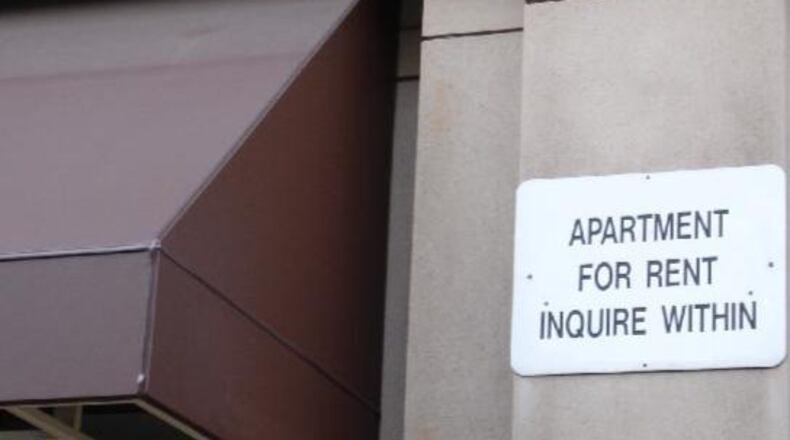Thousands of metro Atlanta renters hit hardest financially by the pandemic are now at risk of being evicted as court hearings resume for the first time since the coronavirus struck.
More than 10,000 eviction cases have been on hold in metro Atlanta during the health crisis, but courts in DeKalb and Gwinnett counties resumed landlord-tenant hearings this week. Fulton and Cobb plan to restart next week. Judges generally plan to start with cases that were filed before the pandemic hit but have not yet been ruled on.
During the pandemic, as thousands lost their jobs and income, housing advocates have grown increasingly worried that a wave of evictions will hit metro Atlanta while the coronavirus remains a serious public health threat. Unlike some other states, Georgia does not have a statewide eviction moratorium.
“People were already suffering before. When the pandemic happened, it just snowballed,” said Monica DeLancy, a tenants’ rights advocate and founder of a renters association in Cobb County’s Riverside area.
Organizations that assist the homeless and others seeking housing resources said they are bracing for a possible “crisis” over housing as the eviction cases are addressed. Residential and commercial landlords pursuing eviction said they have to follow the law and enforce their leases.
Using Census survey data, global consulting firm Stout Risius Ross recently estimated that over 40% of renters in Georgia could find themselves at risk of eviction due to an inability to pay rent during the pandemic. The data suggests Black and Hispanic communities will be disproportionately affected.
There is no statewide standard for how or when eviction cases should be handled, meaning residents in different counties face different procedures if faced with eviction. Gwinnett and Cobb, for example, are holding in-person hearings in courtrooms with social distancing procedures in place.
DeKalb and Fulton are only holding virtual hearings; Fulton, which is usually considered the state’s busiest eviction court and has a backlog of over 9,000 cases, does not plan to hold in-person eviction hearings until at least November.
During a virtual hearing held Tuesday in DeKalb County Magistrate Court, Judge Phyllis Williams told tenants that she understands many may have lost their income due to a job loss or health reason.
Credit: DeKalb County Magistrate Court/Screenshot via YouTube
Credit: DeKalb County Magistrate Court/Screenshot via YouTube
“While that may be a legitimate reason for not paying rent, unfortunately it is not a legal reason,” Williams explained. “The court understands, particularly during the times of COVID, that you may be experiencing some financial hardship. But under the law in the state of Georgia, those hardships are no fault of the landlord.”
Some of the DeKalb cases were resolved as the tenants agreed to a payment plan. Tenants who do not have a legal defense to eviction, Williams said, must move out within seven days or the county marshal will be called to evict them.
Gwinnett County’s in-person hearings started Wednesday, with no more than five cases being heard during each court session. The Magistrate Court there also offered some virtual hearings and kept the courtrooms open to the public, Chief Magistrate Judge Kristina Hammer Blum said.
“Because this is the first day we’ve held (eviction) cases since before March 13,” Blum said, “staff and judges will debrief at the end of the day and we will reassess as we continue to move forward.”
DeLancy said she is thankful Cobb is holding in-person hearings because it eliminates any confusion or technical issues that can sometimes accompany a virtual hearing.
To help renters who may be displaced, the Atlanta Legal Aid Society plans to hire paralegals and place them in local courts. Under the new “Navigators” program, the Legal Aid employees plan to help tenants find new housing, employment or access to other resources to get them back on their feet, said Kristin Verrill, the director of grants and innovation at Atlanta Legal Aid.
“Now the need really exists in a more dramatic way,” she said, adding that they hope to help 6,000 people over the next two years.
Some courts are also directly coordinating with organizations that help tenants facing eviction. Cobb County, for example, allocated $1.5 million in federal funding to Star-C, a nonprofit that started a rent relief fund earlier this year to give direct financial assistance to tenants.
Some local renters still have protections during the pandemic. Atlanta Mayor Keisha Lance Bottoms recently signed an executive order calling on properties subsidized by governmental and quasi-governmental agencies to not file evictions.
For several months, the federal government also barred properties that have federally backed loans or receive many types of federal housing subsidies from pursuing evictions over nonpayment of rent, but that moratorium expired in late July.
Eviction cases pending in metro Atlanta, as of late July:
- Fulton County: 2,500 eviction cases pending before the pandemic hit, 6,500 evictions filed since mid-March
- Cobb County: Over 1,000 cases
- DeKalb County: Nearly 2,000 cases filed since mid-March
- Gwinnett County: Data not available
About the Author
The Latest
Featured




